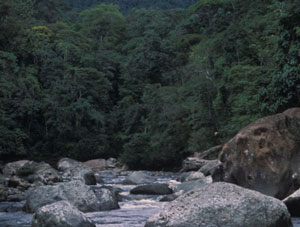The International Tropical Timber Council has committed US$13.3 million for new projects and activities for the conservation and sustainable management, use and trade of tropical forest resources.
The Council is the governing body of the International Tropical Timber Organization (ITTO). It meets twice a year to discuss a wide-ranging agenda aimed at promoting sustainable tropical forest management and the trade of sustainably produced tropical timber. The funds pledged this week at its 39th session are in addition to the US$7.6 million committed in June at the previous Council session, bringing the total pledged in 2005 to almost US$21 million.
The Council financed twelve projects and three pre-projects at this session, including one to implement a reduced impact logging training project in Guyana and another to assist in the restoration of Thai forests damaged in the Asian tsunami. Also financed was a project to develop criteria and indicators for the evaluation of forest management in Mexico's tropical forests, and another to assess the sustainability of the wooden furniture industry in Malaysia. The Council also financed twin projects to continue the work on transboundary conservation on the border between Ecuador and Peru in the Condor Mountains.
The Council also adopted a biennial work program for 2006–07 with a total budget of US$10.2 million for its implementation; of this, US$6.44 million was committed at this session. It includes, among other things, US$3.05 million to help improve the capacity of ITTO member countries to implement CITES listings of timber species and US$240,000 to assist countries to develop systems to demonstrate the legality of their timber exports. An additional US$200,000 were committed to review the timber markets in two significant tropical timber importing countries, and US$229,000 to work with the private sector in producer countries to study the feasibility of adopting timber tracking systems, including by supporting five pilot schemes. The work program also includes almost US$400,000 to field-test a draft set of revised ITTO Guidelines on the Conservation of Biological Diversity in Tropical Production Forests.
The Council decided to extend the Yokohama Action Plan to the end of 2007 to bring it into line with the biennial work program.
The major donors at this session were the governments of Japan, Switzerland and the United States, while The Nature Conservancy (an NGO) and the governments of Finland, Australia, the Republic of Korea, the Netherlands and France also pledged funds. In addition, funds were mobilized from the Organization's unearmarked resources, including the Bali Partnership Sub-account B.
Descriptions of the newly funded projects will be published in a later edition of the ITTO Tropical Forest Update. For more information on the Council session go to www.itto.or.jp.
US$13 million in new funds for tropical forests
12 November 2005, Yokohama, Japan

The Condor transboundary conservation area.
Photo: Conservation International